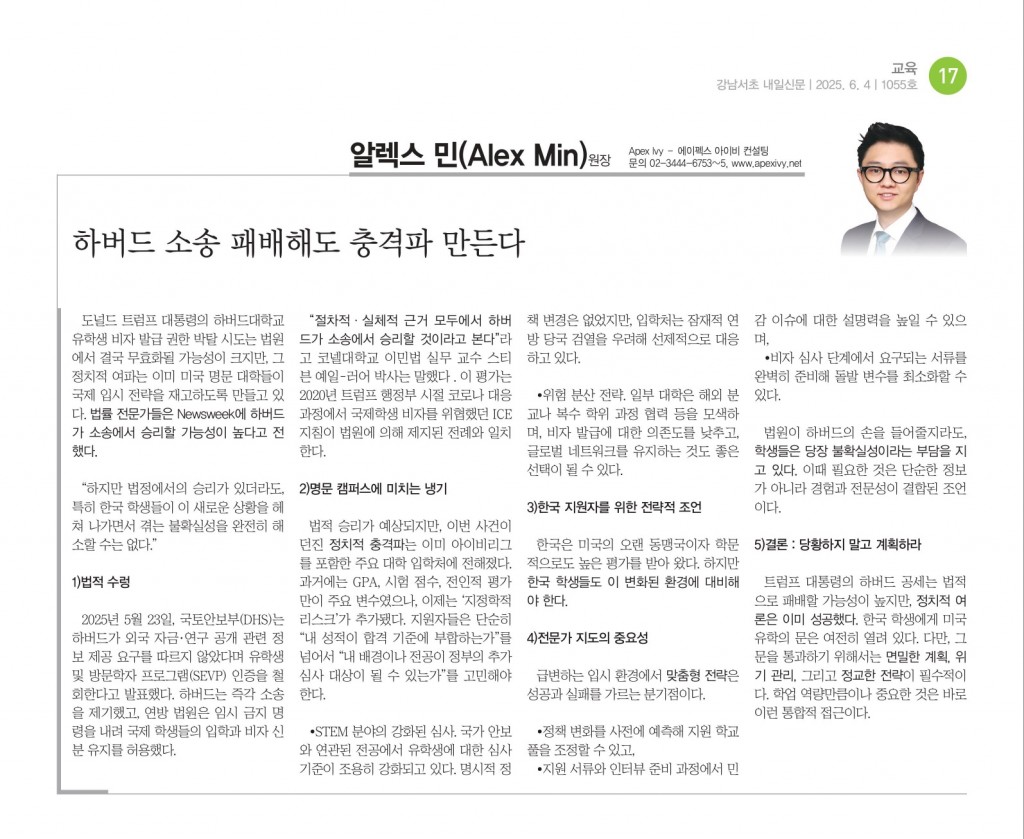도널드 트럼프 대통령의 하버드대학교 유학생 비자 발급 권한 박탈 시도는 법원에서 결국 무효화될 가능성이 크지만, 그 정치적 여파는 이미 미국 명문 대학들이 국제 입시 전략을 재고하도록 만들고 있다. 법률 전문가들은 Newsweek에 하버드가 소송에서 승리할 가능성이 높다고 전했다 .
“하지만 법정에서의 승리가 있더라도, 특히 한국 학생들이 이 새로운 상황을 헤쳐 나가면서 겪는 불확실성을 완전히 해소할 수는 없다.”
법적 수렁
2025년 5월 23일, 국토안보부(DHS)는 하버드가 외국 자금·연구 공개 관련 정보 제공 요구를 따르지 않았다며 유학생 및 방문학자 프로그램(SEVP) 인증을 철회한다고 발표했다. 하버드는 즉각 소송을 제기했고, 연방 법원은 임시 금지 명령을 내려 국제 학생들의 입학과 비자 신분 유지를 허용했다.
“절차적·실체적 근거 모두에서 하버드가 소송에서 승리할 것이라고 본다”라고 코넬대학교 이민법 실무 교수 스티븐 예일‑러어 박사는 말했다 . 이 평가는 2020년 트럼프 행정부 시절 코로나 대응 과정에서 국제학생 비자를 위협했던 ICE 지침이 법원에 의해 제지된 전례와 일치한다.
명문 캠퍼스에 미치는 냉기
법적 승리가 예상되지만, 이번 사건이 던진 정치적 충격파는 이미 아이비리그를 포함한 주요 대학 입학처에 전해졌다. 과거에는 GPA, 시험 점수, 전인적 평가만이 주요 변수였으나, 이제는 ‘지정학적 리스크’와 온라인 활동 이력까지 추가됐다.
지원자들은 단순히 “내 성적이 합격 기준에 부합하는가”를 넘어서 “내 배경이나 전공이 정부의 추가 심사 대상이 될 수 있는가”뿐 아니라,과거 SNS 게시물이 문제시될 수 있다는 점을 함께 고민해야 한다.
● STEM 분야의 강화된 심사. 국가 안보와 연관된 전공에서 국제 지원자에 대한 심사 기준이 조용히 강화되고 있다. 명시적 정책 변경은 없었지만, 입학처는 잠재적 연방 당국 검열을 우려해 선제적으로 대응하고 있다.
● 위험 분산 전략. 일부 대학은 해외 분교나 복수 학위 과정 협력 등을 모색하며, 비자 발급에 대한 의존도를 낮추고, 글로벌 네트워크를 유지하는 것도 좋은 선택이 될 수 있다.
● SNS 계정도 심사 대상. 최근 국토안보부는 비자 심사 과정에서 지원자의 소셜 미디어 활동 내역을 검토하는 방안을 재강조하며, 이를 학생비자 포함 각종 비자 심사에 적극 반영하겠다는 입장을 밝혔다. 이는 기존에도 간헐적으로 적용되던 절차이나, 하버드 사태 이후 비자 발급 결정에 있어 SNS 내용이 외부 사상적 영향 또는 정치 성향의 지표로 해석될 수 있는 가능성이 커졌음을 시사한다.
한국 지원자를 위한 전략적 조언
한국은 미국의 오랜 동맹국이자 학문적으로도 높은 평가를 받아 왔다. 하지만 한국 학생들도 이 변화된 환경에 대비해야 한다.
1. 전공 선택이 중요하다. 인문학, 사회과학, 공중 보건, 예술 분야는 상대적으로 안보 심사에서 자유롭다. STEM에서 특히 국가 안보와 관련된 전공이라면 명확한 연구 목적과 민감 이슈에 대한 이해를 입증해야 할 수 있다.
2. 비자 규정 준수를 철저히 해야 한다. 무단 근로, 음주 운전, 체류 기간 초과, 전공 변경 미통보 같은 작은 위반도 강화된 집행 환경에서 불이익으로 이어질 수 있다.
3. 활동에 신중을 기해야 한다. 헌법상 표현의 자유는 보장되지만, 정치·인권 시위 참여는 비자 갱신이나 신분 변경 시 불리하게 작용할 수 있다. 시민 참여와 리스크를 균형 있게 고려해야 한다.
전문가 지도의 중요성
급변하는 입시 환경에서 맞춤형 전략은 성공과 실패를 가르는 분기점이다.
● 정책 변화를 사전에 예측해 지원 학교 풀을 조정할 수 있고,
● 지원 서류와 인터뷰 준비 과정에서 민감 이슈에 대한 설명력을 높일 수 있으며,
● 비자 심사 단계에서 요구되는 서류를 완벽히 준비해 돌발 변수를 최소화할 수 있다.
법원이 하버드의 손을 들어줄지라도, 학생들은 당장 불확실성이라는 부담을 지고 있다. 이때 필요한 것은 단순한 정보가 아니라 경험과 전문성이 결합된 조언이다.
결론 : 당황하지 말고 계획하라
트럼프 대통령의 하버드 공세는 법적으로 패배할 가능성이 높지만, 정치적 극장은 이미 성공했다. 한국 학생에게 미국 유학의 문은 여전히 열려 있다. 다만, 그 문을 통과하기 위해서는 면밀한 계획, 위험 관리, 그리고 정교한 전략이 필수적이다. 학업 역량만큼이나 중요한 것은 바로 이런 통합적 접근이다.
개인 상담 문의:
– 카카오톡 ID: apexivy
– 전화: 02-3444-6753~5
– 시간: 평일 오전10시~ 오후7시
www.apexivy.net
